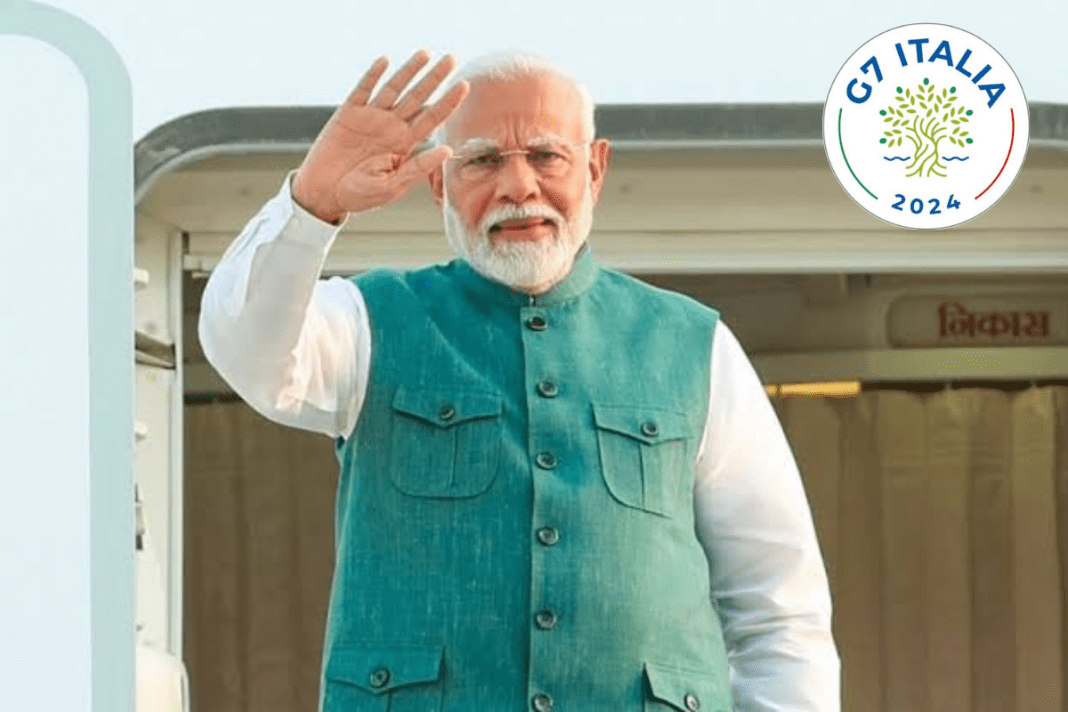Prime Minister Narendra Modi arrived in Apulia, Italy, to attend the G7 Summit, marking his first foreign visit in his third term as PM. This year’s summit, taking place from June 13 to 15, sees Italy presiding over the Group of Seven (G7) countries. As an Outreach Country, India’s participation underscores its growing influence on the global stage. The summit comes at a crucial time, with the G7 nations—Italy, Canada, France, Germany, Japan, the United Kingdom, the United States, and the European Union—navigating complex global challenges. PM Modi’s agenda includes a series of bilateral meetings and participation in an outreach session, reflecting the significance of India’s role in global affairs.
Origin of the G7
The G7 originated from a 1973 meeting in Paris, France, where finance ministers and central bank governors gathered to address major economic challenges, including an oil crisis, rising inflation, and the collapse of the Bretton Woods system. This system had fixed the US dollar’s value against gold, with other global currencies pegged to the dollar. As the dollar became overvalued, a new mechanism for exchange rates was needed, prompting the creation of a forum for major industrialised democracies to coordinate economic policies.
The first G7 summit took place in 1975 in Rambouillet, France, attended by the leaders of France, Germany, the United Kingdom, the United States, Italy, and Japan. Canada joined the following year, and since 1977, representatives of the European Economic Community, now the European Union, have also participated. Russia’s inclusion in 1998 expanded the group to the G8, but its membership was suspended in 2014 following its annexation of Crimea.
Evolution and Relevance of the G7
Over the years, the G7 has evolved from an economic forum to a platform addressing a range of global challenges. Despite lacking a permanent administrative structure, the G7 rotates its presidency annually, with the presidency serving as a temporary secretariat. The annual summit concludes with a communiqué outlining political commitments, influencing global governance, agenda-setting, and decision-making processes.
However, the G7’s relevance has been questioned as the combined share of its members in global GDP has fallen from roughly 50% in the 1970s to around 30% in 2018. The economic growth of China, India, and other emerging economies has led to calls for a more representative global governance structure. In comparison, the G20, established in response to the 2008 financial crisis, is seen as a more inclusive forum. Analysts from the think tank Bruegel argue that the G20’s creation demonstrated the G7’s inability to handle modern-day crises. Yet, the G20’s size and heterogeneity can hinder decision-making, leading some to propose a reconfigured G7+, which would include representatives from China, India, and Brazil to better reflect the current global economic landscape.
Challenges and Achievements of the G7
The G7 has faced challenges in achieving cooperation within the group. For example, during his presidency, US President Donald Trump was often at odds with other G7 leaders, notably skipping a meeting on climate issues at the 2019 summit. Despite such challenges, the G7 has achieved several milestones and played a crucial role in shaping international policies. It has been instrumental in coordinating economic policies, promoting free and fair trade practices, shaping global governance issues, and supporting security cooperation and development assistance.
Agenda for the 2024 G7 Summit
The 2024 G7 summit in Italy holds significant importance for several reasons. First, it aims to coordinate economic policies to stabilise the global economy amidst concerns over inflation and trade tensions. This is crucial as the world grapples with the economic aftershocks of the COVID-19 pandemic and ongoing geopolitical conflicts.
Second, the summit will focus on addressing climate change by discussing strategies to reduce carbon emissions and promote sustainable energy sources. With recent records in climate change, collective action is key to tackling such global issues effectively.
Third, drawing lessons from the COVID-19 pandemic, the G7 will prioritise global health initiatives, including pandemic preparedness and vaccine distribution. This reflects a commitment to ensuring that the world is better equipped to handle future health crises.
Additionally, the summit will address geopolitical tensions, including relations with China and Russia, and ongoing conflicts with global implications. The situation in Ukraine and the Middle East will be high on the agenda, with discussions aimed at defending the rules-based international system and addressing regional stability.
Finally, the G7 will explore the regulation of emerging technologies, data privacy, and cybersecurity to ensure they benefit global development. The rapid advancement of artificial intelligence (AI) and other technologies necessitates a collaborative approach to harness their potential while mitigating associated risks.
India’s Role and Contributions
As an Outreach Country, India’s participation in the G7 summit highlights its growing influence in global affairs. Prime Minister Modi’s agenda includes defending the rules-based international system amid Russia’s aggression towards Ukraine, addressing the Middle East conflict, and strengthening partnerships with developing nations, particularly in Africa. Key priorities for India include migration, climate change, food security, and the implications of artificial intelligence (AI) for humanity.
India’s presence at the summit also underscores its role as a bridge between developed and developing nations, advocating for a more inclusive and representative global governance structure. By participating in bilateral meetings and the outreach session, Prime Minister Modi aims to bolster India’s strategic partnerships and contribute to addressing global challenges.
Conclusion
The G7 summit in Italy is a critical platform for addressing pressing global issues, from economic stabilisation and climate change to health initiatives and geopolitical tensions. Prime Minister Modi’s participation reflects India’s growing prominence on the world stage and its commitment to contributing to global solutions. As the G7 continues to evolve, the inclusion of emerging economies like India is essential for a more representative and effective global governance framework.
PM Modi G7 Summit, G7 Summit 2024, Prime Minister Modi Italy visit, G7 Summit agenda, India at G7 Summit, G7 Summit Apulia Italy, G7 climate change discussions, Global economic stabilisation G7, G7 geopolitical tensions, Emerging technologies regulation G7
FAQs on PM Modi’s Agenda at the G7 Summit in Italy
- What is the purpose of Prime Minister Narendra Modi’s visit to Italy for the G7 Summit?
Prime Minister Narendra Modi is attending the G7 Summit in Apulia, Italy, as part of his first foreign visit in his third term. His agenda includes participating in bilateral meetings and an outreach session to address global challenges and strengthen India’s strategic partnerships. - What are the main topics of discussion at the 2024 G7 Summit?
The main topics of discussion at the 2024 G7 Summit include:- Stabilising the global economy amidst inflation and trade tensions.
- Addressing climate change and promoting sustainable energy sources.
- Prioritising global health initiatives, including pandemic preparedness and vaccine distribution.
- Managing geopolitical tensions, particularly with China and Russia.
- Regulating emerging technologies, data privacy, and cybersecurity.
- How has the G7 evolved since its inception?
The G7 originated in 1973 as a forum for finance ministers and central bank governors to address economic challenges. It has evolved from focusing solely on economic issues to addressing a wide range of global challenges. Despite its lack of a permanent structure, the G7 influences global governance through its annual summits and communiqués outlining political commitments. - Why is the relevance of the G7 being questioned?
The relevance of the G7 is questioned due to the declining share of its members in global GDP, falling from about 50% in the 1970s to around 30% in 2018. The rise of emerging economies like China and India has led to calls for a more representative global governance structure, with some suggesting a reconfigured G7+ that includes these nations. - What role does India play in the G7 Summit as an Outreach Country?
As an Outreach Country, India plays a significant role in the G7 Summit by contributing to discussions on global issues such as the rules-based international system, climate change, food security, and artificial intelligence. India’s participation underscores its growing influence and its position as a bridge between developed and developing nations, advocating for a more inclusive global governance framework.





